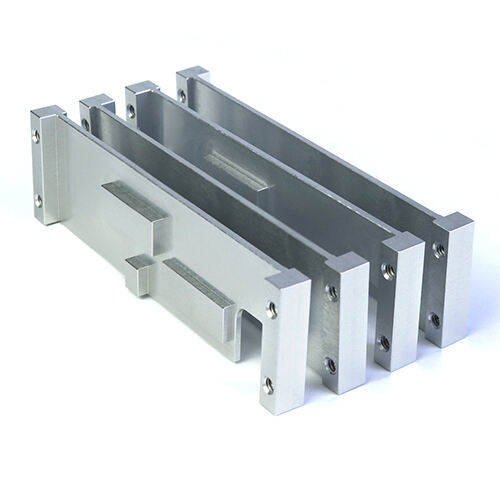金属部品の加工と製造 明日の革新を牵引する力

現代製造業の急速な進化に伴い、金属部品の加工と製造はイノベーションの基盤として台頭しています。航空宇宙から自動車、電子機器から再生可能エネルギーまで、高精度で耐久性がありコスト効率の良い金属部品の必要性はかつてなく重要になっています。新しい技術への対応が求められる中、金属部品の製造プロセスは急速に進化しており、スピード、持続可能性、そして比類ない正確さを提供する最先端の方法を採用しています。
なぜ今日の金属部品製造が重要なのか
1. 複雑な設計のための精密エンジニアリング
航空宇宙、自動車、医療技術などの産業におけるイノベーションを推進する主要な要因の一つは、最高精度基準を満たす部品の必要性です。航空機エンジン、自動車トランスミッション、医療用インプラントなど、重要なシステムに使用される金属部品には、厳密な公差と高性能材料が要求されます。
高度なCNC加工、レーザーカット、ウォータージェットカットは、メーカーがミクロン単位で極めて正確な部品を作成する方法を革命的に変えました。この高精度な金属部品を製造する能力により、より複雑な設計の可能性が広がり、製品性能が向上し、製品寿命も延びています。
2. コスト効率とスピード
今日の競争の激しい市場では、スピードとコストが重要な要素です。従来の製造方法は、長いリードタイムと高価な金型費用を伴うことが多かったため、企業が市場の需要に迅速かつ経済的に対応することが難しかったです。しかし、金属部品加工や製造におけるイノベーション、例えば追加製造(3Dプリンティング)やロボット自動化などがその状況を変えつつあります。
3. 持続可能性と廃棄物削減
持続可能性は現代の製造業において主要な焦点となっています。伝統的な金属加工プロセスでは、原材料の金属を切り出し、穴あけ、または機械加工して形状を作り出すため、多くの材料が廃棄されることがあります。しかし、金属部品加工における新しい技術により、より持続可能な実践が可能になっています。
4. カスタマイズと柔軟性
カスタマイズされた金属部品に対する需要の増加は、航空宇宙、自動車、医療機器などの産業にとって大きな変化をもたらしました。伝統的な製造方法では大規模な量産が必要であることが多かったのに対し、現代の金属部品加工技術は少量の高カスタマイズ部品を生産する柔軟性を提供します。
5. 極限環境用の先進材料
産業が製品からさらに多くのものを求めているにつれて、先進材料への需要が増しています。ジェットエンジン、発電所、油田装置など、高ストレス環境で使用される金属部品は、極端な温度、圧力、摩耗に耐えられる必要があります。このような要求に対応するために、チタン、高強度鋼、ニッケル合金などの材料がますます使用されています。
レーザー焼結や電子ビーム溶融といった金属部品加工技術は、メーカーがこれらの先進合金を扱うことを可能にし、強度だけでなく軽量で腐食に強い部品を生産します。これは特に、素材の性能が安全性、効率、寿命に直接影響する航空宇宙や再生可能エネルギーなどの産業において重要です。
金属部品加工と製造から恩恵を受ける産業
航空宇宙および防衛: 航空宇宙分野では、超精密で軽量かつ高性能な金属部品が必要です。CNC加工やアディティブマニュファクチャリングにより、メーカーは航空機エンジン、翼、主脚装置など、極めて高い精度と強度を持つ複雑な部品を作ることができます。
自動車および電気自動車: 高性能エンジン部品からカスタマイズされた電気自動車用コンポーネントまで、自動車産業は耐久性があり、効率的で、コスト効果の高いソリューションを生み出すために金属部品加工に大きく依存しています。電気自動車への移行が加速するにつれて、バッテリー、駆動系、車体フレーム用のカスタムメタルコンポーネントに対する需要が引き続き増加しています。
医療機器: 医療業界では厳しい安全性基準を満たす金属部品が必要とされています。チタン製インプラント、手術器具、診断機器などはすべて、機能性と生体適合性を確保するために高精度な製造方法に依存しています。
エネルギーと再生可能エネルギー: 持続可能なエネルギー源への推進により、風力タービン、太陽光パネル、エネルギーストレージシステムに使用される金属部品に対する需要が急増しています。これらの部品は、極端な気象条件に耐えながら最大限の効率を確保するように設計されなければなりません。
電子機器と消費者向け製品: スマートデバイス、ウェアラブル機器、および家電製品への需要が増加するにつれて、金属部品は外装やコネクタから小型で耐久性があり軽量な内部部品まで、あらゆる用途に使用されています。
金属部品加工と製造の未来
技術が進化するにつれて、金属部品加工の未来も変わり続けています。人工知能(AI)、機械学習、そしてIoT(インターネット・オブ・シングズ)などの革新はすでに製造プロセスに統合され、リアルタイムデータ監視、予測保全、品質管理の向上を実現しています。
今後数年で、この業界ではさらなる自動化、専門的な用途向けの先進材料、新しい金属リサイクル方法が導入されるでしょう。これらの変化により、金属部品加工はさらに効率的で持続可能かつ、急速に変化するグローバル市場のニーズに対応できるようになります。
結論
金属部品の加工と製造は、もはや単に部品を作るだけの領域ではありません。それは世界中の産業におけるイノベーションの基盤を作り上げることです。次世代の電気自動車を可能にしたり、耐久性のある医療用インプラントを作成したり、航空宇宙技術の限界に挑戦したりするなど、現代の金属部品製造はあらゆる局面で進歩を牵引しています。最先端の技術と持続可能性へのますます高まる重点により、金属部品加工の未来はかつてないほど明るく、企業がこれまで以上に迅速かつ効率的に高品質でカスタマイズされたソリューションを提供できる能力をもたらします。


